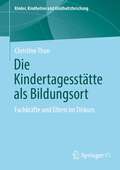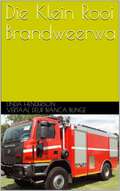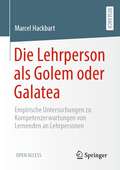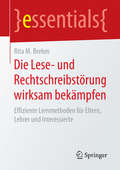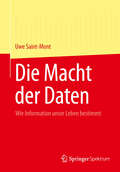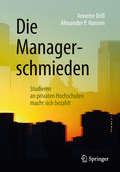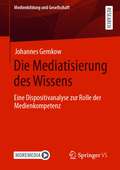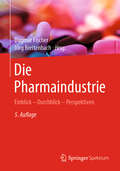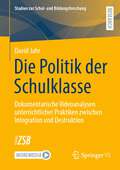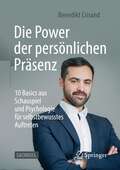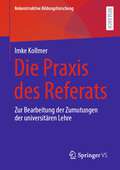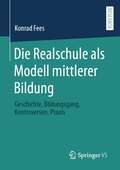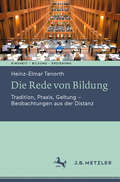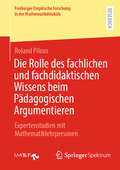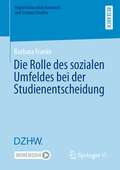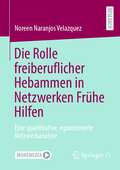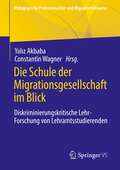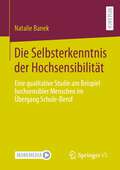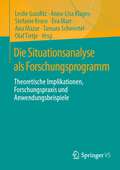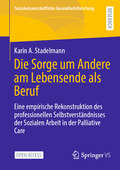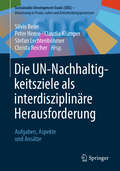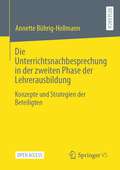- Table View
- List View
Die Kindertagesstätte als Bildungsort: Fachkräfte und Eltern im Diskurs (Kinder, Kindheiten und Kindheitsforschung #27)
by Christine ThonDas Buch präsentiert Ergebnisse eine Studie zu Diskursen über Bildung im Elementarbereich. Gezeigt wird, wie frühkindliche Bildung im Zuge sozialpolitischer Transformationen zum Gegenstand politischer Steuerung wurde und wie dadurch auch das Verhältnis von Familie und Bildungsinstitutionen inklusive der Beziehungen der Beteiligten zueinander neu bestimmt wird.
Die Klein Rooi Brandweerwa
by Linda HendersonDie Klein Rooi Brandweerwa het 'n gelukkige lewe gehad- tot eendag, toe twee nuwe brandweerwaens in sy motorhuis inry. Hy was seker dat hy nie meer verlang of nodig sou wees nie. Dit het hom baie hartseer gemaak. Maar toe eendag, was daar 'n brand in sy rustige dorpie. Vind uit wat gebeur met die klein brandweerwa. Hierdie verhaal sal jou kleintjie (ouderdomme 3-5) wys dat selfs wanneer iets sleg gebeur, kan daar nogsteeds 'n gelukkige einde wees!
Die Lehrperson als Golem oder Galatea: Empirische Untersuchungen zu Kompetenzerwartungen von Lernenden an Lehrpersonen
by Marcel HackbartIn diesem Open-Access-Buch geht es um Kompetenzerwartungen von Lernenden an Lehrpersonen und deren Bedeutung für die Lehr-Lern-Interaktion. Die Lehr-Lern-Interaktion ist ein aufeinander bezogenes Handeln von mindestens einer Lehrperson sowie einer lernenden Person und kann durch verschiedene Phänomene der sozialen Wahrnehmung und Kognition beeinflusst werden – beispielsweise durch Erwartungen. In einigen Untersuchungen zu interpersonalen Erwartungseffekten in der Lehr-Lern-Interaktion stehen die Lehrendenerwartungen an Lernende im Fokus, in anderen die Lernendenerwartungen an Lehrende – zumeist mit ihren Einflüssen auf das Erleben und Verhalten der Lernenden. Marcel Hackbart konzipiert auf Basis des transaktionalen Modells der Lehr-Lern-Interaktion vier aufeinander aufbauende Studien zu Kompetenzerwartungen von Lernenden an Lehrpersonen. Die Ergebnisse der Studien zeigen, dass die Lernendenkompetenzerwartungen an Lehrpersonen einen Einfluss auf die Interaktionsgestaltungen im Lehr-Lern-Kontext haben. Die Effekte auf die Lernenden selbst sind dabei, insbesondere auf Gruppenebene, größer als die Einflüsse auf das Erleben und Verhalten von Lehrpersonen.
Die Lese- und Rechtschreibstörung wirksam bekämpfen: Effiziente Lernmethoden für Eltern, Lehrer und Interessierte (essentials)
by Rita M. BrehmRita Brehm stellt neue Methoden zur Stabilisierung der Sprechwahrnehmung von Schülern vor – wie das „Handlautieren“ oder das „Silbenkonstruieren“ – und erläutert, wie das Silbentrennen, Abschreiben, Diktieren oder Lesen methodisch effizienter zu gestalten ist. Sie zeigt, dass im Zeitalter der Inklusion phonetisch-phonologische Methoden aus der Sprachtherapie zunehmend Eingang in die schulische Förderung gefunden haben. Zur wirksamen Bekämpfung von Lese- und Rechtschreibstörungen benötigt man effiziente Lernmethoden auf der Grundlage wissenschaftlicher Erkenntnisse. Ziel dabei ist, über die Festigung der phonologischen Bewusstheit mit dem eigenen Sprechen gleichermaßen das Lesen und Schreiben anzubahnen und zu festigen. Darüber hinaus erklärt die Autorin, wie das Abschreiben effektiver wird, warum Kurzdiktate unverzichtbar sind und wie Schüler zum beständigen Lesen motiviert werden können.
Die Logiken der Friedensstiftung verstehen: Politisches Lernen und Friedenskonzepte (Citizenship. Studien zur Politischen Bildung)
by Gabriele DanningerDas Buch gibt einen umfassenden Überblick zu einer Politikdidaktik für den Frieden. Es veranschaulicht theoretische Grundlagen, Friedenskonzepte und Friedenstheorien und enthält aktuelle Diskurse zum politischen Lernen und der Vermittlung von Friedensbildung im Unterricht. Das Buch zielt darauf ab, die Friedensbildung als festen Bestandteil des Geschichts- und Politikunterrichts zu etablieren, einen aktiven und bewussten Umgang mit dem Thema „Frieden“ in unseren Klassenzimmern zu fördern und den internationalen Diskurs in der Fachdidaktik zur „Friedensbildung“ voranzutreiben.
Die Macht der Daten
by Uwe Saint-MontDieses Buch könnte Ihre Daten-Weltanschauung verändern. Unsere Leichtfertigkeit im Umgang mit Daten ist sträflich. Sie werden sinnlos erhoben, falsch ausgewertet, unterschlagen, geschönt dargestellt und unerlaubt gespeichert oder weitergegeben. All dies sind jedoch lässliche Sünden, wenn man sie mit dem größten Fehler vergleicht: auf Daten zu verzichten! Sachorientierte Politik, soziale Netze, das Bildungssystem oder die Wirtschaft funktionieren alle nur mit einem permanenten und zuverlässigen Datenfluss, der in die richtigen Kanäle gelenkt werden muss. Daten sind der Rohstoff unserer modernen Informationsgesellschaft, unser Anker im Boden der Tatsachen. Anhand von vielen Beispielen - vom Gartenvogel bis zum Geldmarkt - erklärt dieses Buch, wie wir mit Daten umgehen und welche Möglichkeiten wir bislang nicht nutzen. Wann wir ihnen zu viel zumuten oder zu wenig zutrauen. Und wie Daten uns viel umfassender als bisher helfen können, eine immer komplexere Welt zu verstehen.
Die Managerschmieden: Studieren an privaten Hochschulen macht sich bezahlt
by Alexander P. Hansen Annette Doll10 Erfolgstipps für die richtige Studienwahl! Das Buch erläutert die Vorteile eines Studiums an einer deutschen, privaten Hochschule und erklärt, warum „Education Made in Germany“ ein international hochwertiges Produkt ist. Die Autoren zeigen konkrete Strategien, um die Studienorganisation erfolgreich zu gestalten, sodass Zeit und Geld sich auszahlen und auch der Spaß am Studium nicht zu kurz kommt. Mithilfe ihrer internationalen Expertise und anhand zahlreicher realer Erfolgsbeispiele deutscher sowie ausländischer Absolventen geben die Autoren dieses Ratgebers 10 Erfolgsgeheimnisse preis, die dabei helfen, das passende Studium an der richtigen Hochschule zu wählen und den Grundstein für ein erfülltes Berufsleben zu legen.
Die Mediatisierung des Wissens: Eine Dispositivanalyse zur Rolle der Medienkompetenz (Medienbildung und Gesellschaft #46)
by Johannes GemkowDas Ziel des vorliegenden Buches ist es, das Konzept der Medienkompetenz an die aktuellen Herausforderungen der Digitalisierung anzupassen. Der Fokus liegt auf der spezifischen Übertragung, Darstellung, Prozessierung und Speicherung von digital repräsentiertem Wissen. Die zugrundeliegende Annahme ist, dass jede Medientechnologie Wissen auf je spezifische Art und Weise repräsentiert. Diese Medienspezifik beschreibt der Autor exemplarisch und empiriegeleitet an der Wikipedia, um schließlich das Konzept der Medienkompetenz daran anzupassen.
Die Pharmaindustrie: Einblick - Durchblick - Perspektiven
by Dagmar Fischer Jörg BreitenbachAktualisiert und erweitert wird ein Überblick über die Aktivitäten in der pharmazeutischen Industrie gegeben: Wie funktioniert die Arzneimittelentwicklung? Welche Strukturen hat die Pharmaindustrie, wer gehört zu den internationalen "Playern"? Dieses seit vielen Jahren erfolgreiche Buch beschreibt die relevanten Schritte der Entwicklung, Zulassung, Produktion, Vermarktung, Geschäftsentwicklung und Patentierung von Arzneimitteln. Dabei werden Vergleiche zwischen Europa und den USA angestellt. Auch China und die sog. emerging markets werden betrachtet.
Die Politik der Schulklasse: Dokumentarische Videoanalysen unterrichtlicher Praktiken zwischen Integration und Destruktion (Studien zur Schul- und Bildungsforschung #92)
by David JahrDavid Jahr untersucht in dieser Studie die Schulklasse als Kollektiv. Auf Basis von Unterrichtsvideografien rekonstruiert der Autor die Prozessstrukturen von vier Klassen, die gemeinsam eine politische Unterrichtsmethode (Dorfgründungssimulation) durchführen und dabei eine politische Struktur hervorbringen. Im Kern schließen die Schulklassen hierfür an ihre bisher konstituierte informelle Hierarchie an. Der zentrale Befund, dass sich die Politik der Schulklasse typisiert als Integration, Distinktion oder Destruktion differenzieren lässt, wird abschließend vor dem Hintergrund politikdidaktischer Wissensbestände eingeordnet.
Die Power der persönlichen Präsenz: 10 Basics aus Schauspiel und Psychologie für selbstbewusstes Auftreten
by Benedikt CrisandDieses Buch verrät Ihnen, mit welchen einfachen, aber wirksamen Techniken Sie in jeder Situation selbstsichere Präsenz erreichen und Wirkung erzielen. Benedikt Crisand verbindet schauspielerische und psychologische Elemente zu Verhaltenstechniken, die sich im Berufsalltag einsetzen lassen, um durch physische Präsenz Aufmerksamkeit zu gewinnen. So treten Sie in jeder Situation selbstbewusst, authentisch und glaubwürdig auf und agieren entsprechend.Sie erfahren in zehn konkreten Schritten, wie Sie Mimik, Gestik, Stimme und Körpersprache einsetzen, um in beruflichen Situationen souverän und überzeugend zu wirken.Mit Videos: Laden Sie die SN More Media App kostenfrei herunter, scannen Sie einen Link mit dem Play-Button und spielen Sie sofort das Video auf Smartphone oder Tablet aus.Der Inhalt• Denkfehler und Irrtümer aufdecken• Zielwirkung festlegen• Wahrnehmung schärfen• Gedanken konkretisieren• Gestik lesen und selbstbewusst einsetzen• Mimik interpretieren• Hoch- und Tiefstatus einsetzen• Stimme und Sprache benutzen• Charaktere in beruflichen Situationen einordnen• Körpersprache erleben
Die Praxis des Referats: Zur Bearbeitung der Zumutungen der universitären Lehre (Rekonstruktive Bildungsforschung #39)
by Imke KollmerDie Arbeit widmet sich dem studentischen Referat in Universitätsseminaren. Diese in den geistes- und sozialwissenschaftlichen Disziplinen etablierte Form studentischer Beteiligung wird in Bezug auf ihre interaktionslogische Funktion und Bedeutung untersucht. Erkenntnisleitend ist hierbei die These, dass Referate eine für Dozierende spezifische Form der Bearbeitung der Zumutungen der universitären Lehre darstellen. Das Referat wird von aller Inanspruchnahme einer gelingenden Lehrpraxis gelöst und theoretisch wie empirisch als Ausdrucksgestalt der deutschen Universität rekonstruiert. Anhand des Fokus auf die kommunikative Orientierung seminaristischer Praxis mit und ohne Referate lassen sich überdies zentrale Elemente einer Theorie der universitären Lehre skizzieren.
Die Realschule als Modell mittlerer Bildung: Geschichte, Bildungsgang, Kontroversen, Praxis
by Konrad FeesIn der vorliegenden Studie wird die Schulform Realschule in ihrer Besonderheit unter den Aspekten Historie, Bildungsgang, Schülerschaft, Lehrerbildung, Beschäftigungspolitik und Schulleistung untersucht und vorgestellt. Es wird gezeigt, dass die Realschule über Jahrzehnte erfolgreich eine solide Grundbildung mit einer anwendungsorientierten fachlichen und überfachlichen Bildung verband, die zum Eintritt in aussichtsreiche Laufbahnen in Technik, Handel, Dienstleistung und Verwaltung befähigte. Im Zuge der jüngeren Schulentwicklung mit veränderten Übergangsquoten und dem Aufkommen bildungsgangübergreifender Angebotsformen droht das bewährte Modell mittlerer Bildung allerdings obsolet zu werden. In dieser Situation ist eine Besinnung auf die Alleinstellungsmerkmale realer Bildung notwendig.
Die Rede von Bildung: Tradition, Praxis, Geltung - Beobachtungen aus der Distanz (Kindheit – Bildung – Erziehung. Philosophische Perspektiven)
by Heinz-Elmar TenorthBildung gehört zu den zentralen Begriffen der öffentlichen Debatte über die wünschenswerten Zukünfte von Individuen und Gesellschaft, über die Praxis des Bildungswesens und über Chancengleichheit und Bildungsgerechtigkeit. Gleichzeitig ist der Begriff mit Erwartungen überlastet und seine theoretische Qualität bestenfalls ungeklärt. Zur Prüfung von Status, Funktion und Geltung des Begriffs rekonstruiert der Band zunächst (I) die Tradition des Bildungsdenkens und die seither argumentativ verengte Praxis der Rede von Bildung. Gegen die Dominanz von Emphase, Skepsis und Kritik wird dann (II) demonstriert, dass und wie Bildung im Lebenslauf und im Bildungssystem möglich wird. Abschließend (III) wird kritisch geprüft, ob sich die Rede von Bildung auch als Bildungstheorie ausweisen kann. Redeform und Lebensform von Bildung haben, so das Fazit, zwar lebensweltliche, aber keine theoretische Geltung.
Die Rolle des fachlichen und fachdidaktischen Wissens beim Pädagogischen Argumentieren: Expertenstudien mit Mathematiklehrpersonen (Freiburger Empirische Forschung in der Mathematikdidaktik)
by Roland PilousDie Forschung zum Pädagogischen Argumentieren untersucht, wie Lehrpersonen ihr Wissen nutzen, um zu produktiven Unterrichtshandlungen zu kommen. Es wird insbesondere angenommen, dass fachliches und fachdidaktisches Wissen relevant ist, um Vor- und Nachteile alternativer Unterrichtshandlungen in typischen Anforderungssituationen zu analysieren und so zu professionellen Entscheidungen zu gelangen. In der vorliegenden Arbeit wird die Nutzung des mathematikbezogenen fachlichen und fachdidaktischen Wissens von angehenden Mathematiklehrpersonen (Novizen) und qualifizierten Mathematiklehrpersonen (Experten) verglichen. Die dazu durchgeführten Studien liefern empirische Belege dafür, dass sich Expertise von Mathematiklehrpersonen auch in der Fähigkeit zeigt, verschiedene fachliche und fachdidaktische Argumente flexibel auf potentielle Unterrichtshandlungen beziehen zu können. Das fachliche und fachdidaktische Wissen entfaltet demnach seine Wirkung für die Unterrichtspraxis insbesondere dann, wenn dieses in Form von fachlichen und fachdidaktischen Argumenten integrativ auf Unterrichtshandlungen bezogen werden kann.
Die Rolle des sozialen Umfeldes bei der Studienentscheidung (Higher Education Research and Science Studies)
by Barbara FrankeBarbara Franke thematisiert in dem vorliegenden Buch die Rolle des sozialen Umfeldes der Studienberechtigten im Prozess der Studienentscheidung. Basierend auf soziologischen Wert-Erwartungs-Theorien und unter Berücksichtigung psychologischer, sozialkapitaltheoretischer und netzwerktheoretischer Ansätze werden die Mitschüler*innen, Freund*innen, Eltern und weitere relevante Netzwerkkontakte als Einflussfaktoren betrachtet und das Zusammenspiel zwischen kontextualen und individuellen Merkmalen ermittelt. Die empirischen Befunde belegen die Relevanz des sozialen Umfeldes bei der Studienentscheidung. Die Normen und das Verhalten relevanter Bezugsgruppen stehen direkt und indirekt im Zusammenhang mit der Entscheidung, ob Studienberechtigte ein Hochschulstudium aufnehmen.
Die Rolle freiberuflicher Hebammen in Netzwerken Frühe Hilfen: Eine quantitative, egozentrierte Netzwerkanalyse
by Noreen Naranjos VelazquezRegionale Vernetzung von Angeboten Früher Hilfen erhöht die Wahrscheinlichkeit für gesundes und sicheres Aufwachsen von Kleinkindern. Aus sozialökologischer Perspektive ist anzunehmen, dass Interaktionen im Netzwerk abhängig sind vom Kontext und persönlichen Merkmalen. Erstmalig genutzt wurde die egozentrierte Netzwerkanalyse, um interprofessionelle Vernetzung freiberuflicher Hebammen im Rahmen einer Lokalstudie standardisiert zu untersuchen. Daten von Hebammen und Adressatinnen wurden mit Mehrebenenanalysen und multiplen linearen Regressionen statistisch ausgewertet.
Die Schule der Migrationsgesellschaft im Blick: Diskriminierungskritische Lehr-Forschung von Lehramtsstudierenden (Pädagogische Professionalität und Migrationsdiskurse)
by Constantin Wagner Yalız AkbabaDer Band präsentiert Produkte erfolgreichen forschenden Lernens in Form von theoretischen und empirischen Ergebnissen aus studentischen Forschungsprojekten, die sich aus machtkritischen, postkolonialen und poststrukturalistischen Perspektiven mit der Schule in der Migrationsgesellschaft beschäftigen. Die Beispiele zeigen wie Schule, ihre Akteure und Artefakte auf der Ebene von Unterrichtsinteraktionen und in Form von Schulbuchinhalten Fremdheit herstellen, Schüler_innen (und Lehrer_innen) in Prozessen des Othering subjektivieren, aber auch welchen Verhandlungsprozessen rassifizierende Mechanismen unterworfen werden.
Die Selbsterkenntnis der Hochsensibilität: Eine qualitative Studie am Beispiel hochsensibler Menschen im Übergang Schule-Beruf
by Natalie BanekZiel dieses Bandes ist es, unter Anwendung der Grounded Theory Methodologie zu erforschen, wie hochsensible Personen die Transition von der Schule in den Beruf bewältigen. Dazu wurden sowohl Expert*inneninterviews als auch problemzentrierte Interviews mit Betroffenen geführt und in einem systematischen Fallvergleich ausgewertet. Als Ergebnis resultiert die Selbsterkenntnis der Hochsensibilität in Form einer neuentwickelte Grounded Theory, in welcher der Prozess der Selbsterkenntnis der Hochsensibilität als zentrales Schlüsselphänomen ergänzt von 20 weiteren Kategorien zum Erleben hochsensibler Menschen steht, darunter ursächliche und intervenierende Bedingungen, Kontextkategorien und Handlungsstrategien sowie Konsequenzen, welche sich in der Folge ergeben. Damit wird in dem vorliegenden Band zum einen dargelegt, wie hochsensible Menschen ihren Prozess der Selbsterkenntnis erleben und zum anderen wird die Bedeutung dieses Schlüsselmoments im Leben hochsensibler Personen auf die Prozesse der Berufsorientierung und Berufswahl aus berufspädagogischer Perspektive thematisiert.
Die Signifikanz von: Eine Analyse ausgewählter Bildungslehrpläne für den Islamischen Religionsunterricht (BestMasters)
by Gökce AydinEntwicklungspsychologische Forschungen belegen, dass moralische Emotionen wie Mitgefühl eine entscheidende Rolle bei der Entwicklung ethischer Urteils- und Handlungsfähigkeiten spielen. Ein zentraler Ansatzpunkt dieses Buches ist die islamisch-theologische Analyse von Mitgefühl, das auf den Prinzipien der Barmherzigkeit und Liebe basiert. Diese Prinzipien legen nahe, dass der Mensch aufgrund seiner religiösen und ontologischen Natur dazu befähigt ist, Mitgefühl als eine göttliche Gabe zu verstehen und als religiösen Auftrag im Umgang mit anderen Menschen und der Schöpfung zu praktizieren. Daher ist die Förderung von Mitgefühl im Religionsunterricht aus religionspädagogischer Perspektive von Bedeutung. Diese Arbeit setzt sich mit der theoretischen Fundierung des Mitgefühls auseinander und reflektiert verschiedene didaktische Zugänge. Durch eine exemplarische Analyse des Kerncurriculums in Niedersachsen und des Kernlehrplans in Nordrhein-Westfalen werden mögliche inhaltliche, methodische und didaktische Implikationen für den Islamischen Religionsunterricht herausgearbeitet. Auf der Grundlage dieser Analyse werden Ideen zur Integration des Mitgefühls in den Islamischen Religionsunterricht entwickelt.
Die Situationsanalyse als Forschungsprogramm: Theoretische Implikationen, Forschungspraxis und Anwendungsbeispiele
by Olaf Tietje Eva Marr Leslie Gauditz Anna-Lisa Klages Stefanie Kruse Ana Mazur Tamara SchwertelDer Sammelband trägt die unterschiedlichen Debatten um die Situationsanalyse in Anschluss an Adele Clarke zusammen. In den einzelnen Kapiteln werden hierzu theoretische, methodologische und/oder empirische Überlegungen wie auch deren Leerstellen und Weiterführungen diskutiert sowie methodische Ansätze konkretisiert. Damit greift die Publikation offene Fragen und Weiterführungen des Clarke‘schen Theorie-Methoden-Pakets der Situationsanalyse auf und liefert so einen Beitrag zur Fortentwicklung einer Methodologie, die insbesondere für inter- und transdisziplinäre Forschungsprojekte vielfältige Impulse bietet. Der Sammelband adressiert (Nachwuchs-)Forschende, die mit der Situationsanalyse arbeiten oder diesen Ansatz für ihre Arbeit entdecken möchten. Das Werk soll sowohl Studierende als auch Wissenschaftler*innen und Praktiker*innen unterschiedlicher Disziplinen und Ausrichtungen ansprechen.
Die Sorge um Andere am Lebensende als Beruf: Eine empirische Rekonstruktion des professionellen Selbstverständnisses der Sozialen Arbeit in der Palliative Care (Sozialwissenschaftliche Gesundheitsforschung)
by Karin A. StadelmannDieses Open Access Buch behandelt die Arbeitsweisen der Sozialen Arbeit in der Palliative Care, um deren Sichtbarkeit zu erhöhen. Die zentrale Forschungsfrage lautet, wie Fachkräfte der Sozialen Arbeit ihr berufliches Handeln in der Palliative Care beschreiben. Die Autorin führte dazu Interviews mit Sozialarbeitenden in Hospizen und auf Palliativabteilungen. Aus den Erzählungen wurden Orientierungsmuster und Begründungen extrahiert und im Kontext ausgewählter strukturtheoretischer und interaktionistischer professionstheoretischer Grundlagen analysiert. Die Ergebnisse betonen verschiedene Motive für die Soziale Arbeit, die das professionelle Selbstverständnis in der Begleitung am Lebensende strukturieren. Besonders die "Unbestimmbarkeit im Alltag als beruflicher Standard" und "die Suchbewegung als professioneller Akt" verdeutlichen die Bedeutung alternativer Konzepte für Professionalität und Fallbearbeitung für die Sorge am Lebensende. Die Ergebnisse gewinnen zudem an Bedeutung vor dem Hintergrund versorgungspolitischer Entwicklungen. Die Darlegungen zu institutionellen und politischen Bedingungen in der Schweiz legen weitere Eckpfeiler fest, um die professionelle Eigenständigkeit der Sozialen Arbeit in der Palliativversorgung zu stärken.
Die Syrien-Krise: Vergangenheit, Gegenwart und Zukunft
by Shahid Hussain Raja Omar Hayat RajaErläutert das Wesen und die Ursprünge der gegenwärtigen Krise in Syrien vor dem Hintergrund der geopolitischen und sonstigen Verwerfungen im Nahen Osten, zählt die Interessen der verschiedenen globalen und regionalen Mächte auf und zeigt auf, wie sie auf die sich rasch entwickelnde Situation reagieren, zeigt mögliche Ergebnisse auf und schlägt den besten Weg vor.
Die UN-Nachhaltigkeitsziele als interdisziplinäre Herausforderung: Aufgaben, Aspekte und Ansätze (Sustainable Development Goals (SDG) – Umsetzung in Praxis, Lehre und Entscheidungsprozessen)
by Christa Reicher Silvio Beier Peter Hense Claudia Klümper Stefan LechtenböhmerDieses Buch gibt Einblicke in die Zielsetzungen und zu den Herausforderungen der Nachaltigkeistzielde der UN. Ausgehend von den Blickwinkeln einzelner Fachdisziplinen wird allgemein verständlich die Zelsetzung mit einem Blick auf europäische Verhältnisse erläutert und mit den Anforderungen an andere Fachdisziplinen verknüpft, die notwendig sind, damit ein Erreichen realistisch und zielführend vorangetrieben werden kann.
Die Unterrichtsnachbesprechung in der zweiten Phase der Lehrerausbildung: Konzepte und Strategien der Beteiligten
by Annette Bührig-HollmannIn diesem Open-Access-Buch werden anhand einer kommunikationsanalytischen Studie unterschiedliche Konzepte der Ausbildenden und der Auszubildenden für die Unterrichtsnachbesprechung rekonstruiert. Die Unterrichtsnachbesprechung in der zweiten Phase der Lehrerausbildung gilt für viele Referendarinnen und Referendare als eine besondere Belastung innerhalb ihrer Ausbildung. Mit der Rekonstruktion der in NRW programmatischen Leitideen erwachsenenpädagogischer Prinzipien einerseits und den Positionierungen der Referendar:innen andererseits offenbaren sich diverse Spannungslagen in der Lehrer:innenbildung. Neben der strukturell angelegten Doppelfunktion der Ausbildung (Beratungund Beurteilung) sind es vor allem die unterschiedlichen Orientierungen der Beteiligten mit ihrer heterogenen Erwartungskultur, die die Kommunikation in Ausbildungskontexten stören.
